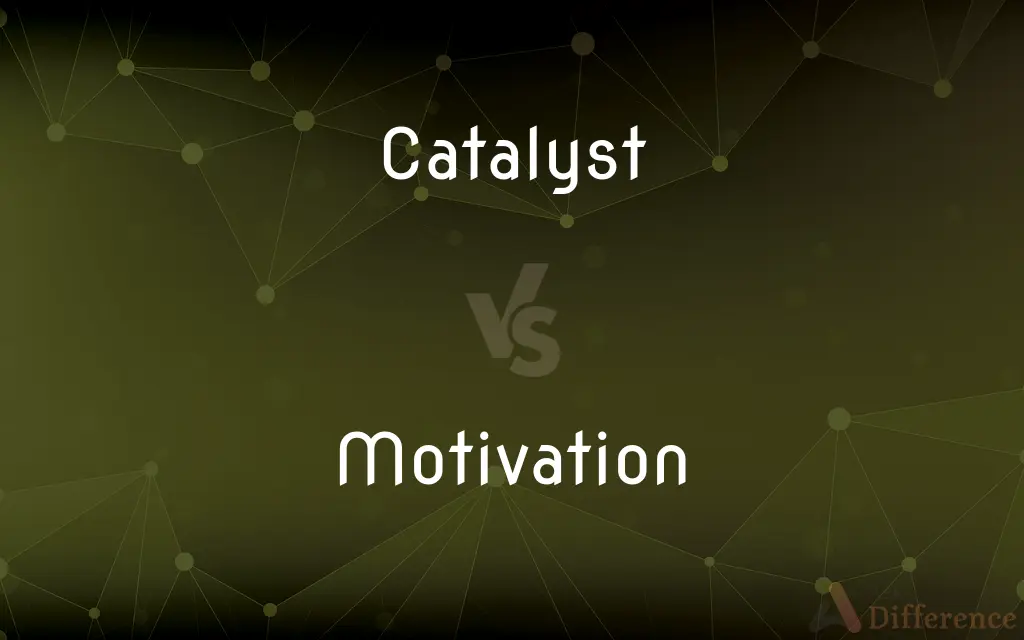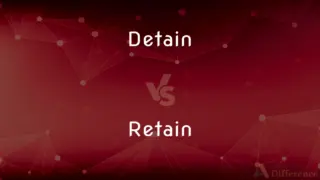Catalyst vs. Motivation — What's the Difference?
Edited by Tayyaba Rehman — By Maham Liaqat — Updated on April 30, 2024
A catalyst is an agent that triggers or speeds up a reaction without itself being consumed, while motivation refers to the driving force that encourages individuals to achieve goals.

Difference Between Catalyst and Motivation
Table of Contents
ADVERTISEMENT
Key Differences
A catalyst typically refers to a substance that accelerates a chemical reaction, making processes more efficient without being altered itself. On the other hand, motivation is a psychological impetus that prompts a person to act towards a specific objective, driven by desire or necessity.
In broader terms, a catalyst can be any event or person that precipitates change or action without being fundamentally changed. Whereas, motivation is more about internal or external forces that inspire and sustain an individual’s action or behavior.
A catalyst in a social or work context might be a new policy or a pivotal incident that leads to significant changes in behavior or operations. In contrast, motivation in the same contexts would refer to personal or shared goals and values that drive individuals or groups to engage and persist in tasks.
The effect of a catalyst is often immediate and observable, as it directly influences the dynamics of a process or situation. Motivation, however, might build over time, influencing behavior through emotional or cognitive processes.
Understanding a catalyst is more about recognizing the elements that can trigger change, while understanding motivation involves delving into human psychology and personal values to comprehend why actions are taken.
ADVERTISEMENT
Comparison Chart
Definition
Agent that triggers or accelerates a reaction
Driving force behind goal-oriented actions
Nature
Often external, operational
Primarily internal, psychological
Duration of Effect
Immediate and specific
Long-term and continuous
Role
Triggers change without altering itself
Sustains and directs behavior
Examples
Enzymes in a reaction, a pivotal event
Personal aspirations, rewards, needs
Compare with Definitions
Catalyst
Something that initiates or accelerates a change.
The new manager acted as a catalyst for much-needed organizational reforms.
Motivation
The general desire or willingness of someone to do something.
Team activities boost motivation among employees.
Catalyst
A substance that increases the rate of a chemical reaction without itself undergoing any permanent chemical change.
Enzymes are biological catalysts that aid in digestion.
Motivation
A psychological feature that arouses an organism to act towards a desired goal.
Recognition is a powerful motivation for continued excellence.
Catalyst
An agent that provokes or speeds significant change or action.
The innovation acted as a catalyst in the technology sector.
Motivation
The reason or reasons one has for acting or behaving in a particular way.
His motivation for studying hard is to get into a good college.
Catalyst
An event or person that precipitates a significant change.
The publication of the research findings served as a catalyst for new studies.
Motivation
The driving force behind human actions.
Her motivation to help others led her to volunteer abroad.
Catalyst
A factor that triggers a process or event.
His arrival was the catalyst for the team's turnaround.
Motivation
Internal and external factors that stimulate desire and energy in people to be continually interested and committed.
Personal growth is a key motivation for many in their careers.
Catalyst
A substance that increases the rate of a chemical reaction without itself undergoing any permanent chemical change
Chlorine acts as a catalyst promoting the breakdown of ozone
Motivation
Motivation is what explains why people or animals initiate, continue or terminate a certain behavior at a particular time. Motivational states are commonly understood as forces acting within the agent that create a disposition to engage in goal-directed behavior.
Catalyst
(Chemistry) A substance, usually used in small amounts relative to the reactants, that modifies and increases the rate of a reaction without being consumed in the process.
Motivation
The act or process of motivating
The coach's effective motivation of her players.
Catalyst
One that precipitates a process or event, especially without being involved in or changed by the consequences
"A free press ... has remained ... a vital catalyst to an informed and responsible electorate" (Robert O'Neal).
Motivation
The state of being motivated; having a desire or willingness to act
Students with a high level of motivation.
Catalyst
(chemistry) A substance that increases the rate of a chemical reaction without being consumed in the process.
Motivation
Something that motivates; an inducement, reason, or goal
“If your primary motivation in life is to be moral, you don't become an artist” (Mary Gordon).
Catalyst
Something that encourages progress or change.
Economic development and integration are working as a catalyst for peace.
Motivation
Willingness of action especially in behavior.
Catalyst
(literature) An inciting incident that sets the successive conflict into motion.
Motivation
The action of motivating.
Catalyst
(automotive) A catalytic converter.
Motivation
Something which motivates.
Catalyst
(fantasy) An object that facilitates the casting of a spell (such as a magic wand).
Motivation
An incentive or reason for doing something.
Catalyst
A substance that initiates or accelerates a chemical reaction without itself being affected; as, thousands of enzymes serve in concert as calaysts to produce the sequence of reactions we call "life"; the industrial production of cheap ammonia depended on finding a good catalyst.
Motivation
(advertising) A research rating that measures how the rational and emotional elements of a commercial affect consumer intention to consider, visit, or buy something.
The motivation scores showed that 65% of people wanted to visit our website to learn more about the offer after watching the commercial.
Catalyst
Something that serves as a precipitating occasion for an event; as, the invasion acted as a catalyst to unite the country.
Motivation
The act or process of motivating.
Catalyst
Something or someone that causes events to happen with itself being changed.
Motivation
The mental process that arouses an organism to action; as, a large part of a teacher's job is to give students the motivation to learn on their own.
Catalyst
(chemistry) a substance that initiates or accelerates a chemical reaction without itself being affected
Motivation
The goal or mental image of a goal that creates a motivation{2}; as, the image of a peaceful world is a powerful motivation for only a rare few individuals.
Catalyst
Something that causes an important event to happen;
The invasion acted as a catalyst to unite the country
Motivation
The psychological feature that arouses an organism to action toward a desired goal; the reason for the action; that which gives purpose and direction to behavior;
We did not understand his motivation
He acted with the best of motives
Motivation
The condition of being motivated;
His motivation was at a high level
Motivation
The act of motivating; providing incentive
Common Curiosities
Can a person be a catalyst?
Yes, a person can act as a catalyst by influencing events or changes without being fundamentally changed themselves.
What is the difference between a catalyst and motivation?
A catalyst is an element that triggers change without being consumed, whereas motivation is the internal or external drive that compels individuals to act.
What are examples of motivations in the workplace?
Examples include career advancement, financial rewards, personal satisfaction, and company culture.
Is motivation always positive?
Not necessarily; motivation can be positive or negative, depending on the goals and the means of achieving them.
Can motivation change over time?
Yes, motivation can change depending on circumstances, personal growth, and external influences.
Is a catalyst necessary for all chemical reactions?
No, not all chemical reactions require a catalyst, but catalysts are used to speed up or facilitate reactions that might otherwise be too slow or not occur at all under normal conditions.
How does a catalyst work in a chemical reaction?
In chemical reactions, a catalyst lowers the activation energy needed for the reaction, thereby speeding it up.
What motivates people to change their behavior?
Factors like personal values, external pressures, desired outcomes, and sometimes immediate needs.
How do social catalysts differ from psychological motivations?
Social catalysts are external events or changes that prompt action, while psychological motivations are internal drives that dictate behavior.
What role does motivation play in education?
Motivation is crucial in education as it drives students to engage, persist, and achieve academic goals.
Share Your Discovery

Previous Comparison
Detain vs. Retain
Next Comparison
Ramet vs. GenetAuthor Spotlight
Written by
Maham LiaqatEdited by
Tayyaba RehmanTayyaba Rehman is a distinguished writer, currently serving as a primary contributor to askdifference.com. As a researcher in semantics and etymology, Tayyaba's passion for the complexity of languages and their distinctions has found a perfect home on the platform. Tayyaba delves into the intricacies of language, distinguishing between commonly confused words and phrases, thereby providing clarity for readers worldwide.
















































